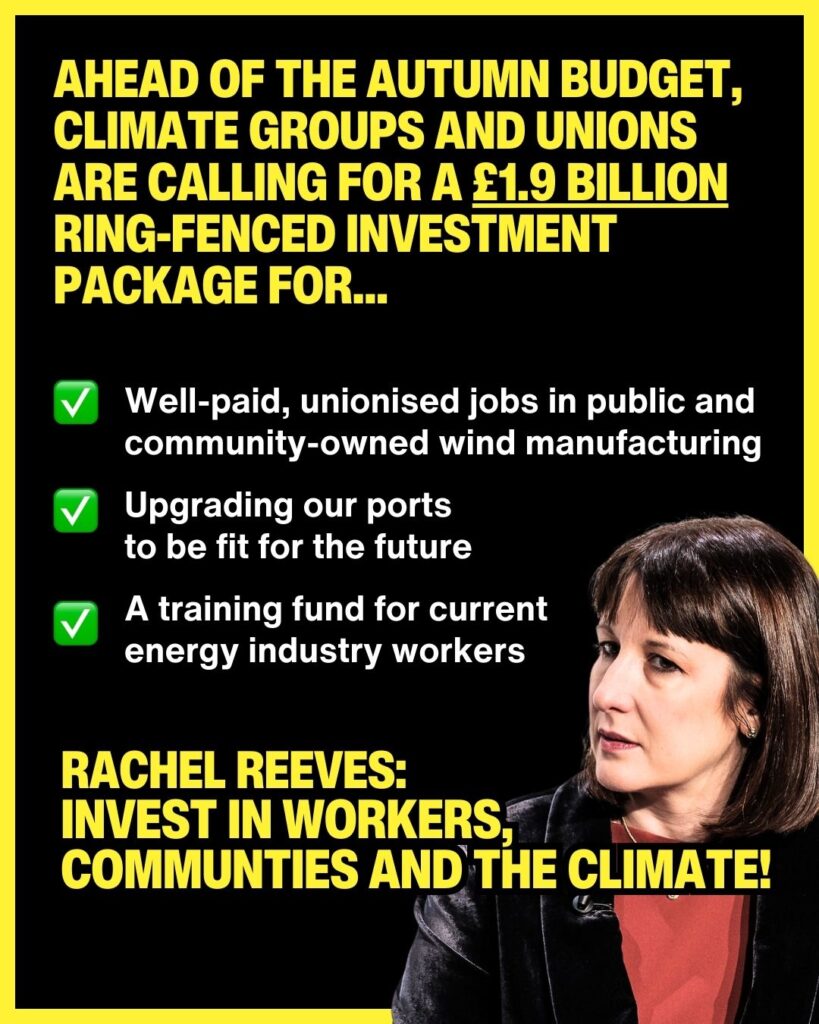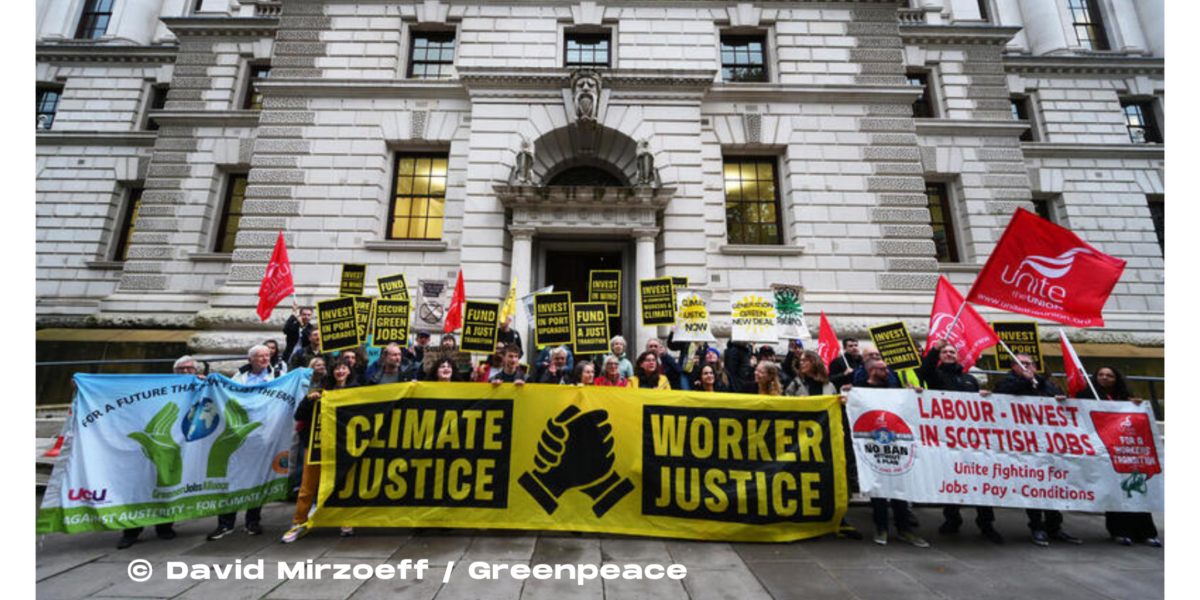Ahead of the Autumn budget, 65 climate organisations – endorsed by leading UK trade unions – have written to the UK Chancellor Rachel Reeves calling for £1.9 billion a year until 2030 in ring-fenced funding to support offshore oil and gas workers and their communities through the transition to renewable energy.

The letter, endorsed by the largest union representing UK offshore workers, Unite the Union, as well as the National Union of Rail and Maritime and Transport Workers (RMT), the Public and Commercial Services Union (PCS), the Scottish Trade Union Congress (STUC) and Moray and Aberdeen’s Trades Union Councils, was delivered to the Treasury at a rally today. It is signed by 65 climate groups including Greenpeace, Uplift, Friends of the Earth, Oil Change International, Extinction Rebellion, Platform and Scottish Communities Climate Action Network (SCCAN).
The letter, endorsed by the largest union representing UK offshore workers, Unite the Union, as well as the National Union of Rail and Maritime and Transport Workers (RMT), the Public and Commercial Services Union (PCS), the Scottish Trade Union Congress (STUC) and Moray and Aberdeen’s Trades Union Councils, was delivered to the Treasury at a rally today. It is signed by 65 climate groups including Greenpeace, Uplift, Friends of the Earth, Oil Change International, Extinction Rebellion, Platform and Scottish Communities Climate Action Network (SCCAN).
While noting that the government’s flagship energy transition policies have the potential to create jobs and lower household bills, signatories warn that delivering on these commitments requires a ‘UK-wide industrial strategy – which prioritises public investment in domestic renewables manufacturing and skills, and expands publicly-owned energy production.’
Climate groups, endorsed by unions representing at least 1.4 million workers nationwide, are jointly calling for a funding package totalling £1.9 billion a year to help the country’s remaining oil and gas workers transition to clean energy jobs, comprising of:
- £1.1 billion per year to develop permanent, local jobs in public and community-owned wind manufacturing;
- £440 million of further investment each year for port upgrades to ease pressure on supply chain bottlenecks, which must include the Government taking equity stakes in port upgrades as critical national infrastructure; and
- £355 million per year to develop a dedicated training fund for offshore oil and gas workers, to be matched by the industry through a Training Levy on employers.

Signatories point to the loss of at least 3000 jobs at Grangemouth Oil Refinery and Port Talbot steelworks as a “damning indictment” of the “failed approach” successive governments have taken towards the energy transition, which allowed industry bosses to prioritise shareholder profits over affordable energy, adequate public investment and job creation.
The letter states that the rapid growth of offshore wind has failed to create adequate jobs growth as manufacturing work is done abroad. It also criticises an ‘unfit’ training regime which makes moving between industries difficult and expensive and has resulted in poor safety standards, with the injury rate in the offshore wind sector 3-4 times larger than in comparable industries.
Mel Evans, Campaigner at Greenpeace said: “For too long, industry bosses have pocketed record profits while oil and gas workers bear the brunt of the decline of North Sea oil and gas. Offshore workers have risked life and limb and suffered long stints away from their families to keep this country moving and it’s time the government repaid their sacrifices with an industrial strategy that puts worker justice at its heart.
“Offshore workers have valuable skills that will be essential to delivering Labour’s clean power target. A proper, ring-fenced funding package to upgrade our energy industry would transform our energy sector, reduce household bills, future proof-jobs and provide opportunities for generations to come.”
Joe Rollin, Senior Organiser at Unite the Union said: “Creating sustainable green jobs must be at the heart of the UK’s renewable energy strategy. We can’t allow a situation where North Sea workers face a cliff edge, with no skilled green jobs to go to while the UK becomes more reliant on importing fossil fuels”
“Today unions, workers and climate groups are uniting behind the urgent need for a transition plan for oil and gas workers and public funding to back it up. The Chancellor must now listen.”
Measures exist to enable the government to easily meet the £1.9 billion funding package, including raising taxes on major polluters and the super rich. The TUC has shown that a modest wealth tax on the richest 140,000 individuals in the UK could raise £10 billion for the public purse. The funding package the groups are calling for is a fraction of the nearly £40 billion post-tax profits that oil and gas companies made in the UK in 2022 and 2023.
Investment is all the more urgent to offset the rapid fall in jobs in the UK’s North Sea oil and gas fields, where reserves are in decline after 50 years of drilling. Jobs supported by the oil and gas industry in the UK have more than halved over the past decade, with some 227,000 jobs lost since 2013, despite the UK government issuing roughly 400 new drilling licences over the same period and energy companies recording record breaking profits.
New analysis also shows that the vast majority of oil and gas companies are not investing in the transition: just seven out of a total of 87 North Sea oil and gas producers plan to invest anything in renewable energy projects between now and 2030, fewer than the number of companies planning to make no investment in the basin at all.
Roz Foyer, General Secretary, Scottish TUC, said: “A market-led approach to net zero isn’t working – for people or planet. In the last month, we’ve seen the announcement that the Grangemouth Refinery is to close and be replaced by an import-export terminal, and the announcement of Harland and Wolff going into administration. Instead of investment to future proof our industries, once again corporate mismanagement and a market-led approach to energy has failed workers and communities in Scotland.
“This letter from environmental groups is therefore hugely welcome. It highlights that trade unions and environmental groups are united in demanding an industrial strategy based on public investment in domestic manufacturing and publicly owned energy production. The UK Government should pay heed.”
David Blair, Secretary of Moray Trades Union Council, which represents workers in a North Sea community heavily reliant on the oil & gas sector, said: “As a North Sea community we rely heavily on the wages of oil and gas workers to support the local economy.
“Offshore work is something many of our young people aspire to, and without it we’ll see even more of them leaving Moray in search of well-paid work elsewhere.
“The new government has promised welcome investment in energy and ports, but it falls short of what we need to safeguard communities and livelihoods here in the northeast.
“We thank all the climate groups who are standing in solidarity with North Sea communities in demanding a genuine worker-led Just Transition.”

